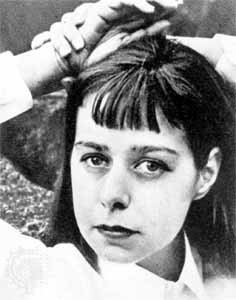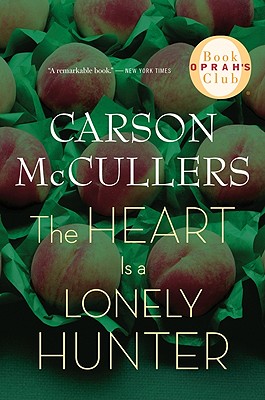Carson McCullers’s (1917-1967) first novel is The Heart is a Lonely Hunter (1940), a book that is often listed among the top twenty American novels. Yes, she was a prodigy, twenty-three when the book was published. Twenty when she started to write this detailed and absorbing study of varieties of loneliness in the five protagonists: John Singer the deaf mute, Biff the widowed cafe owner, Dr. Copeland the black physician, Jake the rootless labor organizer, and Mick the tom-boy of thirteen who is McCullers’s alter-ego. It is set in a wooded Georgia mill town of 30,000, remote and isolated in 1938-1939. How could McCullers with a high school education in Columbia, Georgia have breathed life into these five souls? Well, she could see Mick in the mirror, but even so that leaves the other four.

A brief glance at web comments indicates a learned debate about whether the central character is Singer, a confessional figure to whom each of the others turns for solace, or Mick who passes among them. She and Singer know them all, but they do not all know each other. Only someone with a PhD could fail to see that Mick is the unifying character into whose mind we see. Singer is indeed a sun that the others turn to for warmth but there is no interior. He is a silent blank onto whom others project what they seek, and he patiently accepts them for that. He is no messiah leading them to a promised land, but a reassuring confidante who accepts them as they are and let’s them talk. (He reads lips, and occasionally writes notes in response.) He is so compassionate he cannot live on this earth.
For the time and place the portrayal of Dr. Copeland is striking. A black man of dignity and forbearance who named one of his sons Karl Marx and the other Hamilton for Alexander Hamilton. But like the other principals Copeland can neither communicate nor connect with his children or anyone else. He oscillates between ice cold reason and blind anger. He certainly has cause to be angry.
When Copeland and Jake argue directly or indirectly about whether the root of all evil is racism or capitalism, the writer knows that both are right and that both are wrong. Racism and capitalism each have their evils, but neither is the root. The root is the people who do those evil things. Both are also right that religion plays no part. Religion is conspicuous by its absence in this novel.
When published this book did not make its way onto the shelves of many bookstores in Georgia. In its pages racism is the United States is likened to Nazi fascism. This is not a passing remark, but a repeated theme in the latter part of the novel. In her sympathy and insights in the lives of blacks she is far ahead of that other Southern prodigy William Styron though not to the bone as is William Faulkner.
Throughout, Biff keeps his prodigious file of newspaper cuttings organized by local, national, and international news. He follows the Munich negotiations with interest. The novel draws to a close with Biff filing the cuttings from 31 August 1939. (Germany invaded Poland on 1 September 1939 at that very time.)

As is all her novels and most of her stories there is music. Here is one sample, Mick wanders around the town on hot summer nights and sits in the darkness outside open windows to listen to the radio in the homes of others. It seems she was unbeknownst to herself on a quest and what she sought was this:
“Then the music started. Mick raised her head and her hand went up to her throat. It was like God walking through the night. The outside of her suddenly froze and only that first part of the music was hot inside her heart. She could not even hear what followed, she sat there waiting and frozen, with her fists tight. After a while, the music come again, harder and loud. It was her, this music, walking in the daytime, in the hot sun. The music boiled inside her. She wanted to hang onto it, to all of it. The whole world was this music and she could not listen hard enough to remember it all. Then the opening music again, but this time with different instruments. It was like a hard hand had punched her. And then it ended. This music did not take a long time or short time. It had no time; it was time.”
This is Mick’s reaction to Beethoven’s Third Symphony (Eroica).
By the way, Mick listens at the windows of others because her family cannot afford a radio. Indeed the family is very hard up, and more than once Mick and her seven siblings go to bed hungry. Nothing is made of this in the novel. It is just the way it is, a fact of nature.
This edition is an Oprah BookClub selection. Hooray for Oprah! She and J.K. Rowling have done more good than all the blowhards at the ABC ever have. (I thought I would insert that reference to the ABC in to see if I get any blowback.)
McCullers was driven, and a reader senses that in these pages. The words on the pages burn with an urgency. She kept burning words until she died of a heart attack at age 50. A reader also senses the sorrow in those words. She wrote because she had to write. There is no cause; there is no effect. No label, racism or capitalism, means anything. The truth is that there is sorrow. There is neither relief nor rescue but life goes on.
I know there is a film but I feel no need to see it, and fear it would despoil this fragile creature, this novel. A part of me wants to read another McCullers novel, but another part wants to rest from the emotional despair that envelopes her pages.
ues
